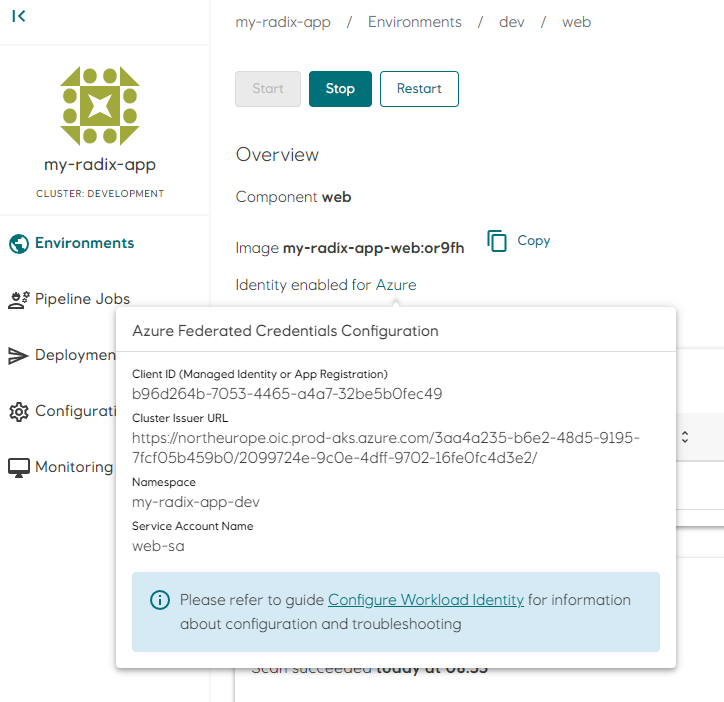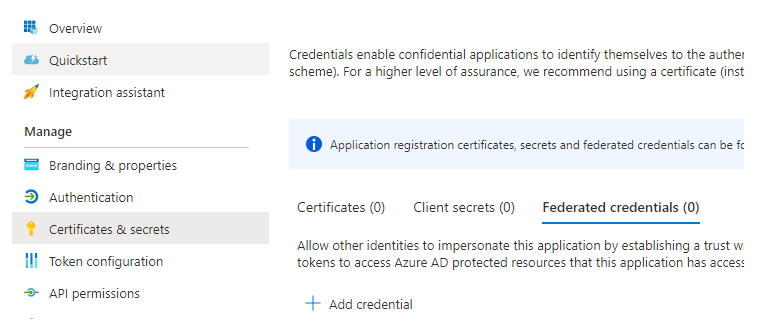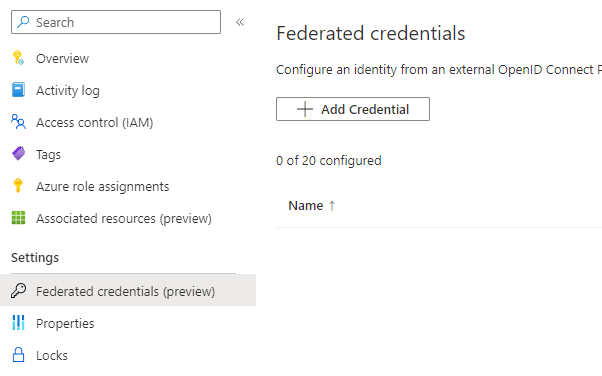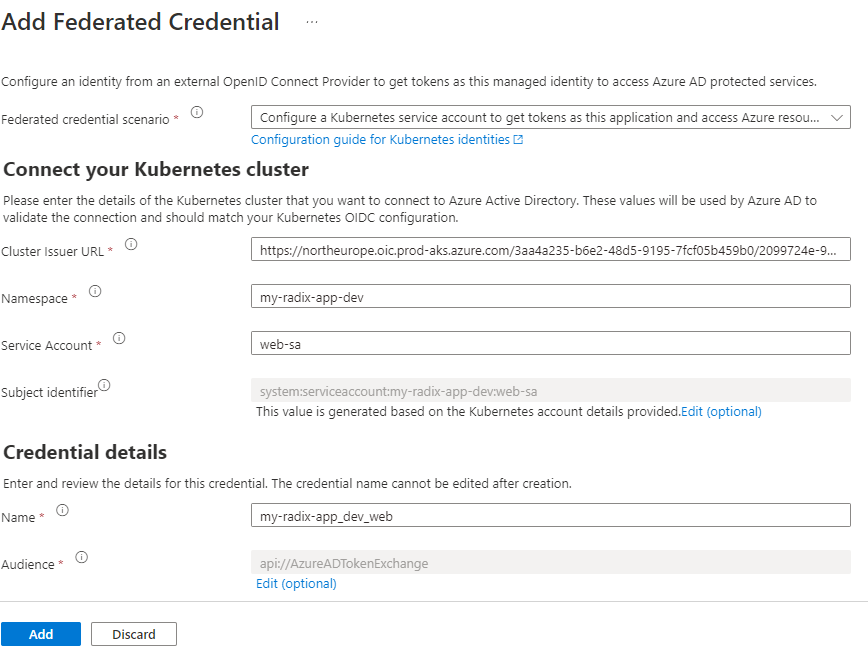Workload Identity
Some workloads (component or job replicas) running in Radix require credentials (JWT access tokens) for an Azure AD app registration or user-assigned managed identity to access Azure AD protected resources, like MS Graph, Key Vaults, Storage Accounts or Azure SQL Databases. Credentials for such workloads can be acquired using the Oauth 2.0 client credentials flow. The client credentials flow permits a workload to use its own credentials to access protected resources instead of impersonating a user. Credentials can be acquired by using either a shared secret, a certificate or with federated credentials.
Using shared secrets or certificates pose a security risk as they have to be stored securely and rotated regularly. With federated credentials, a trust between the workload identity and an Azure AD app registration or user-assigned managed identity is established. The workload identity is a JSON Web Token (JWT) mounted as a file inside the workload's container. The JWT has a short liftime (one hour) and is automatically rotated.
Configure workload identity in Radix
Workload identity for a component or job is configured in the identity (detailed) section in radixconfig.yaml.
The value of clientId is either the Application (client) ID for an Azure AD app registration or the Client ID for a user-assigned managed identity. Read the Azure documentation on how to create an Azure AD app registration or user-assigned managed identity.
apiVersion: radix.equinor.com/v1
kind: RadixApplication
metadata:
name: my-radix-app
spec:
environments:
- name: prod
- name: dev
components:
- name: web
identity:
azure:
clientId: b96d264b-7053-4465-a4a7-32be5b0fec49 # Example value only, must be changed
...
Information required for setting up the trust relationship between a workload and the Azure AD app registration or user-assigned managed identity is available in the component/job page in Radix Web Console.

Configure trust relationship in Azure
Create a trust relationship (federated credential) between the workload (component or job) running in Radix and the app registration or user-assigned managed identity in Azure. A trust must be created per environment and workload. In the example above there are two environments (prod and dev) and one workload (web). Two trust relationships need to be created; one for web in dev environment and one for web in prod environment.
To create a trust relationship, open the Azure Portal, navigate to the Azure AD app registration or user-assigned managed identity configured in clientId and open the Federated credentials page.
For Azure AD app registration, the page is located in Certificates & secrets

For user-assigned managed identities, the page is located in Federated credentials

Click Add Credential and select Kubernetes accessing Azure resources in the drop-down. Fill out the required fields Cluster Issuer URL, Namespace and Service Account with information from the component/job page in Radix Web Console. Enter a value in the Name field that uniquely describes the federated credential, e.g. my-radix-app_dev_web. Click Add to save the changes.

Acquire credentials to access protected Azure resources
When workload identity is configured for a component or job, the following environment variables are set in the running container:
- AZURE_FEDERATED_TOKEN_FILE - path to the file containing the workload identity JWT (e.g.
/var/run/secrets/azure/tokens/azure-identity-token) - AZURE_CLIENT_ID - the value of
clientIdin theidentityconfiguration section (e.g.b96d264b-7053-4465-a4a7-32be5b0fec49) - AZURE_AUTHORITY_HOST - The base URL to Azure identity provider (
https://login.microsoftonline.com/) - AZURE_TENANT_ID - The tenant ID to use when aquiring tokens from the Azure identity provider (e.g. *
3aa4a235-b6e2-48d5-9195-7fcf05b459b0)
The file defined by AZURE_FEDERATED_TOKEN_FILE contains the JWT which identifies the current workload, and is used as the client_assertion value when requesting access tokens for Azure resources using the OAuth 2.0 client credentials flow with federated credentials.
It is recommended to use a SDK/library (see SDKs and examples), like the Azure SDK, to handle the client credentials flow.
SDKs and examples
-
Azure SDK: Programmatically manage and interact with Azure services with built in support for workload identity federation. See examples here.
-
MSAL: Acquire access tokens from the Microsoft identity platform. See examples here.
-
Azure CLI: Interact with Azure services from the command line. Supports login with workload identity federation:
# Login
az login --service-principal -u $AZURE_CLIENT_ID --tenant $AZURE_TENANT_ID --federated-token $(cat $AZURE_FEDERATED_TOKEN_FILE) --allow-no-subscriptions
# Read a secret from a key vault that the logged on service principal has access to
MYSECRET=$(az keyvault secret show -n mysecret --vault-name mykeyvault --query value -o tsv)
- curl: Send HTTP requests to the Microsoft identity platform to acquire access tokens:
curl ${AZURE_AUTHORITY_HOST}${AZURE_TENANT_ID}/oauth2/v2.0/token \
-X POST \
-d "scope=https%3A%2F%2Fgraph.microsoft.com%2F.default
&client_id=${AZURE_CLIENT_ID}
&client_assertion_type=urn%3Aietf%3Aparams%3Aoauth%3Aclient-assertion-type%3Ajwt-bearer
&client_assertion=$(cat $AZURE_FEDERATED_TOKEN_FILE)
&grant_type=client_credentials"
Response:
{
"token_type": "Bearer",
"expires_in": 86399,
"ext_expires_in": 86399,
"access_token": "eyJ0eXAiOiJKV1QiLCJub25jZSI6Ik{a lot of characters here}"
}